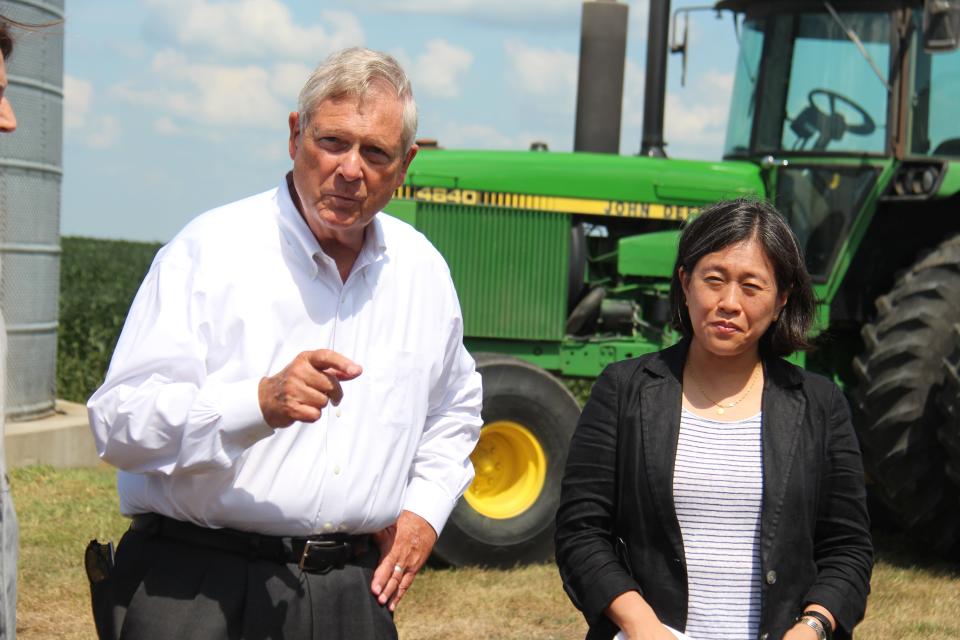Iowa farmers, ag leaders urge Tom Vilsack, Katherine Tai to lower tariffs to ease fertilizer costs
- Oops!Something went wrong.Please try again later.
- Oops!Something went wrong.Please try again later.
WOODWARD, Iowa — Faced with skyrocketing expenses, Iowa farmers urged U.S. agriculture and trade leaders to ease tariffs on fertilizers in an effort to cut their costs to grow next year's corn, soybeans and other crops.
U.S. Agriculture Secretary Tom Vilsack, U.S. Trade Representative Katherine Tai and U.S. Rep. Cindy Axne, a Democrat, met with Iowa farmers and ag leaders on Thursday for more than an hour at a farm near Woodward.
Iowa farmers told the officials, who touted the benefits of the $750 billion Inflation Reduction Act that President Joe Biden signed into law this week, that the prices of fertilizer, seed and other products needed to raise crops are exploding.

"Costs on my farm are up about 325%. It's getting to be unbearable," said Lance Lillibridge, a northeast Iowa farmer and the Iowa Corn Growers Association board president.
An Iowa State University study in June showed that some fertilizer prices are as much as four times higher now than in 2020, while crop prices have roughly doubled.
U.S. farmers rely on nitrogen, potash and other fertilizer imports from China, Russia, Canada, Morocco and other countries to grow their crops. Some of those imports face U.S. tariffs.
More: Judge rules names of landowners in path of carbon capture pipeline should be made public
Earlier this month, three major farm groups asked the Biden administration to provide immediate, short-term relief to farmers by eliminating tariffs on imported potash from Morocco.
In a statement in response to Vilsack's visit, U.S. Sen. Joni Ernst, a Republican, criticized the Biden administration for not doing enough to lower fertilizer tariffs.
"The existing tariffs on fertilizer are nothing more than a tax on our farmers," Ernst said. "They hinder their ability to afford critical nutrients needed to meet the growing demand."
Ernst, among other senators, has urged Biden to waive duties on fertilizer imports, similar to the action the president took to help out the solar industry.
Last month, a federal trade commission rejected efforts to add tariffs on nitrogen products from Russia and Trinidad and Tobago.
Vilsack responded in part to their concerns, saying the U.S. Department of Agriculture is working to boost domestic fertilizer production. Among those efforts, the USDA announced in March it was making $250 million in grants available to encourage U.S. production.
Daniel Heady, the Iowa Farm Bureau Federation's national policy adviser, said the group appreciated the USDA's efforts to boost domestic production. But, he added, it might not come soon enough.
"We're all for building local domestic production of ag inputs, but it takes awhile to do that and a lot of money," Heady said. "Until we get to that point, we need to allow for the free movement of ag products," with reduced tariffs on fertilizers.

Lillibridge said producers are concerned about Mexico's decree to phase out corn that has been genetically modified, the bulk of the U.S. supply. Mexico is the No. 1 market for U.S. corn and dried distillers grain, a byproduct from making ethanol that's high in protein and fed to livestock.
"Mexico is a big deal," Lillibridge said. "We haven't faced any trade disruptions yet, but farmers are very concerned about what could happen."
MORE: As John Deere shifts some jobs from Iowa to Mexico, U.S. trade rep defends trade treaty
Bob Haus, government affairs manager for Corteva Agriscience, said Mexico has already denied approval of 14 seed traits in corn, soybeans and cotton, a trend that will impact U.S. farmers and exports to the country.
Seed traits help determine how well crops can survive growing challenges like pests and severe weather.
"Our freedom to operate is our freedom to innovate," said Haus, who noted that Corteva, formerly DuPont Pioneer in Johnston, employs about 3,000 people in its Iowa operations.
Vilsack said part of Mexico's reasons for phasing out genetically engineered corn by 2024 has to do with the country's heritage. "White corn was first developed and established" in Mexico, he said. "It's about Mexican pride. Mexican heritage. It's unique to them. It's part of their identity."
But Vilsack told Mexico leaders consumers could face rising food costs without U.S. corn to feed livestock. "That made an impression," he said. "And we're in a discussion about how we might get to a better place" on accepting biotech traits and continuing U.S. corn sales to the country.
More: Iowa farmland values spiked a blistering 21% this year, the second-largest increase nationally

Vilsack noted that U.S. farm exports hit a record in 2021. "And we're expecting to do it again this year," given the current export pace, he said. U.S. farm and food exports totaled $177 billion last year, beating a record set in 2014 by nearly 15%, the U.S. Department of Commerce reported.
Craig Floss, CEO of the Iowa Corn Growers Association, said export markets are critical to U.S. corn growers, accounting for about a quarter of the crop, either directly, fed to livestock, or as byproducts, such as dried distillers grains.
Exports are "literally the difference between profits or not on our farms," he said. "We really need to expand our global market access."
Vilsack said he believed that U.S. farmers will lead the nation on reducing greenhouse gases that contribute to climate change, with the help of the Inflation Reduction Act, which provides $19.5 billion to support conservation through traditional USDA programs.
Axne said she pushed for $500 million in the new spending law to build out pumps and other infrastructure so consumers can buy ethanol, biodiesel and other renewable fuel.
Donnelle Eller covers agriculture, the environment and energy for the Register. Reach her at deller@registermedia.com or 515-284-8457.
This article originally appeared on Des Moines Register: Iowa farmers say the cost to grow a crop this year is up 300% or more

